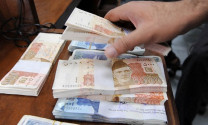First green Sukuk launched
Three-year Ijarah Sukuk oversubscribed 5.4 times, raises Rs31.99b

The government of Pakistan has successfully launched its first three-year Ijarah Green Sukuk, raising Rs31.99 billion at a net rental rate of 10.64%, under its Sustainable Investment Sukuk Framework aligned with the Vision 2028.
The Sukuk offer, initially set at Rs30 billion, drew robust investor interest as total bids amounted to Rs161.74 billion, making it 5.4 times oversubscribed, according to AHL Research Head Sana Tawfik.
The Green Sukuk is a landmark step towards climate-linked, Shariah-compliant financing aimed at attracting capital for environmentally sustainable projects. The launch was commemorated with a gong ceremony at the Pakistan Stock Exchange (PSX), where key stakeholders shared insights into the significance and future of green Islamic finance.
Speaking at the ceremony, Finance Minister Muhammad Aurangzeb praised the market's response, terming it a testament to growing investor confidence in Pakistan's reform trajectory. He highlighted that 14% of the country's bond portfolio now consists of Sukuk instruments, which reflects a strategic pivot towards Islamic finance.
Pakistan's domestic debt stands at Rs37 trillion, of which Rs5 trillion — approximately 14% — is Sukuk-based debt.
The minister reiterated Pakistan's commitment to macroeconomic stability, referencing the IMF's approval of the first review and the $1.3 billion Resilience and Sustainability Facility (RSF) as key recent achievements.
He shared that Pakistan was actively reorganising its debt profile to ensure long-term fiscal health and was working on the upcoming federal budget with a focus on pension reforms and debt servicing efficiency. Innovative funding strategies – both domestic and international – are in the pipeline to support economic resilience and sustainable development.
PSX Board Chairperson Dr Shamshad Akhtar emphasised Pakistan's vision to emerge as a regional hub for Shariah-compliant green finance. She projected the country's climate adaptation needs at $348 billion by 2030, noting that traditional financing methods were insufficient.
Green Sukuks, she said, serve as a gateway to tap into the $4 trillion Islamic finance and $2.5 trillion green bond markets. With over 90,000 megawatts of solar and wind potential, she identified renewable energy and waste-to-energy as key sectors for green investment.
Adviser to Finance Minister Khurram Schehzad pointed to climate change and population growth as Pakistan's two most pressing challenges. He shared signs of fiscal improvement, citing a rise in the tax-to-GDP ratio from 9.5% to 10.6% and a reduction in the debt-to-GDP ratio from 74% to 65%.
Looking ahead, he revealed Pakistan's plans to introduce a Panda bond, enabling access to Chinese capital markets.






















COMMENTS
Comments are moderated and generally will be posted if they are on-topic and not abusive.
For more information, please see our Comments FAQ